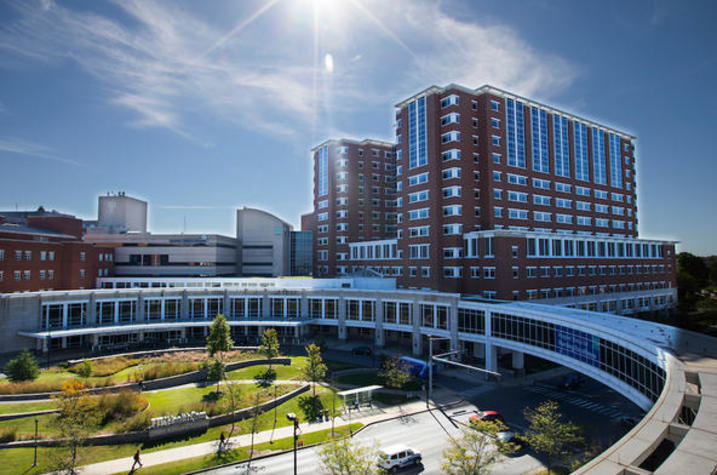UK HealthCare Launches Pediatric Neuroendocrine Tumor Program
LEXINGTON, Ky. (Aug. 26, 2021) — UK HealthCare recently launched a new Pediatric Neuroendocrine Tumor Clinical and Research Program to improve treatment for children diagnosed with or at high risk for developing rare neuroendocrine tumors (NETs). This program is a joint effort between the University of Kentucky Markey Cancer Center and the Kentucky Children’s Hospital and is one of only a handful of centers specializing in this field in the world.
Medical oncologist Aman Chauhan, M.D., pediatric hematologist/oncologist Caryn Sorge, M.D., and pediatric surgical oncologist David Worhunsky, M.D., are leading the program, which will use the resources from both Markey and KCH to provide treatment for children age 18 and under who have been diagnosed with a neuroendocrine tumor, or who have been diagnosed with a condition that predisposes them to developing these tumors.
NETs develop from neuroendocrine cells found in the digestive tract, lungs, pancreas and other sites. They can present unique diagnostic challenges, as neuroendocrine tumors can easily be misdiagnosed for another type of tumor at the same site of origin — for example, pancreatic neuroendocrine tumors can initially be mistaken for pancreatic adenocarcinoma.
Diagnosis of neuroendocrine tumors in children is rare, and treatment options for pediatric patients is limited — in fact, there are currently no Food and Drug Administration (FDA) approved drugs to treat metastatic pediatric NETs. Young patients will often receive the same treatments as adults, but there’s not yet enough research on the pediatric population to develop an FDA-approved standard of care. To help address this issue, Chauhan says that UK will soon be opening a new clinical trial for pediatric NET patients using peptide receptor radionuclide therapy (PRRT), commonly known as Lutathera.
“We use treatments based on our understanding of how we treat neuroendocrine tumors in adults, but there are no FDA-approved therapies for children with this disease,” Chauhan said. “It’s very important to run clinical trials and get some treatments approved for this condition. This is just our humble attempt to start that process of expanding new therapy options in this age group.”
Children who have a strong genetic link to someone diagnosed with NETs — such as a parent or sibling — are at a much higher risk for developing the disease because of an inherited disorder known as multiple endocrine neoplasia (MEN) syndrome. In addition to treating diagnosed pediatric NETs, UK’s program works to diagnose children who are at risk and monitor them closely for signs that an NET is developing. Children with MEN syndrome will receive regular physical examinations, bloodwork and optional imaging as needed to make sure any tumors are caught quickly before they can metastasize.
“These tumors can by asymptomatic in the early stages for a long time,” Chauhan said. “And by the time they present, they’ve become metastatic — and if that happens, again, there’s no FDA-approved treatment. Catching it in its early stages is paramount to these patients.”
Though NETs are often considered rare, they are now being diagnosed at a rate six times higher than roughly four decades ago. In Kentucky, that problem is even more pronounced: a 2018 study led by Chauhan showed a 10-fold increase in NET incidence in the Commonwealth compared to four decades ago. Improved diagnostics and tumor classifications likely account for part of this increase, although whether there are specific environmental factors adding to the increased cases isn’t yet clear.
What is clear, says Chauhan, is that there is a real need for this type of specialized care in the pediatric population.
“There is an absolute unmet need,” Chauhan said. “What I hear from parents is that there is a significant dearth of programs with a multidisciplinary set-up focused on pediatric neuroendocrine cancer. At the UK Markey Cancer Center, we have a multidisciplinary neuroendocrine tumor program, and we are combining that prowess with the expertise of the pediatric oncology program at Kentucky Children’s Hospital. So we’ve come together to form this program to provide specialized care for this unique subset of patients who are otherwise not getting this care elsewhere.”
As the state’s flagship, land-grant institution, the University of Kentucky exists to advance the Commonwealth. We do that by preparing the next generation of leaders — placing students at the heart of everything we do — and transforming the lives of Kentuckians through education, research and creative work, service and health care. We pride ourselves on being a catalyst for breakthroughs and a force for healing, a place where ingenuity unfolds. It's all made possible by our people — visionaries, disruptors and pioneers — who make up 200 academic programs, a $476.5 million research and development enterprise and a world-class medical center, all on one campus.





